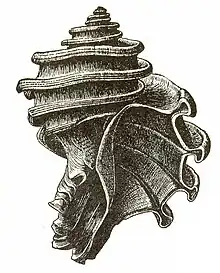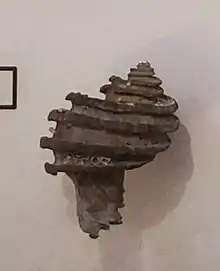Ecphora gardnerae
Ecphora gardnerae is a species of extinct predatory ocenebrinid murex gastropod. Shells of E. gardnerae are found in Miocene-aged marine strata of Maryland and Virginia.
| Ecphora gardnerae Temporal range: | |
|---|---|
 | |
| An apertural view of a shell of Ecphora gardnerae gardnerae, drawn by J. C. McConnell[1] | |
| Scientific classification | |
| Domain: | Eukaryota |
| Kingdom: | Animalia |
| Phylum: | Mollusca |
| Class: | Gastropoda |
| Subclass: | Caenogastropoda |
| Order: | Neogastropoda |
| Family: | Muricidae |
| Genus: | †Ecphora |
| Species: | †E. gardnerae |
| Binomial name | |
| †Ecphora gardnerae Wilson, 1987 | |
Subspecies
Subspecies include:
- Ecphora gardnerae gardnerae, the nominate subspecies
Geological history

This species of large carnivorous sea snail lived during the Miocene epoch, and became extinct more than five million years ago.
This species was previously known as Ecphora quadricostata, but that name is now restricted to a species which is found from Pliocene strata in Virginia to Florida. The Miocene-aged specimens found in Maryland have been assigned to a different taxon, Ecphora gardnerae.[2]
Life habits
As with most other muricids, Ecphora sea snails bored holes through the hard shells of other mollusks, usually bivalves, or sometimes other snails, including other, smaller Ecphoras, in order to feed on their soft insides using a toothed, ribbonlike appendage (common to almost all gastropods) known as a radula.[3]
Commemoration of the fossil
In March 1994, Dr. Eric Seifter testified before the Maryland Legislature that the classification of the Maryland State Fossil, Ecphora quadricostata was invalid (quadricostata is not actually found in Maryland) and needed to be changed to Ecphora gardnerae gardnerae.[3] The fossil was named for geologist Julia Anna Gardner.[4]
References
- Clark, Shattuck & Dall, The Miocene Deposits of Maryland, Maryland Geological Survey (1904), Pl. LII no. 1 as "Ecphora quadricostata".
- Ward & Gilinsky, 'Ecphora (Gastropoda: Muricidae) from the Chesapeake Group of Maryland and Virginia', Notulae Naturae, No. 469 (1988), p. 1, available on line here
- "www.statefossils.com". Maryland State Fossil. Retrieved 23 July 2010.
- "Maryland's Official State Fossil Shell". Maryland Geological Survey. Retrieved 19 August 2012.
- D. Wilson. 1987. Species of Ecphora, including the subgenus Stenomphalus, in the Pungo River Formation. Smithsonian Contributions to Paleobiology 61:21-30